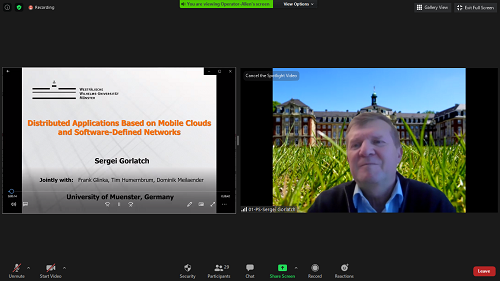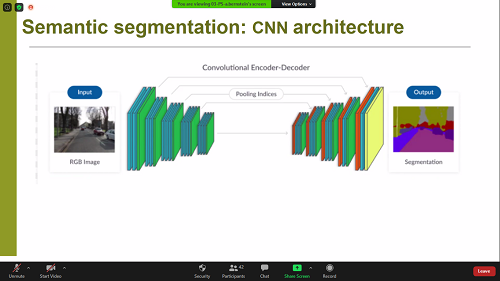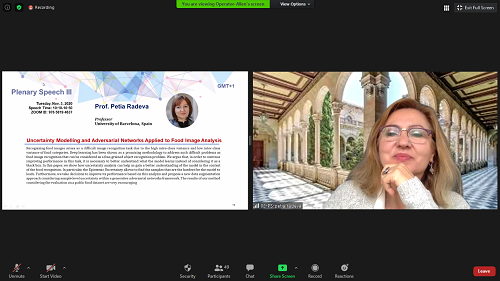After the 12 previous successful International Conferences on Machine Vision, this 13th conference was again a very impressive event where more than one hundred twenty international experts reported about their recent findings in this important field. Originally, this conference was planned to be held in Rome. But as result of the Covid19 pandemic and in contrast to all previous meetings, this conference had to be held as a virtual meeting. Consequently, all presentations had to be given remote via ZOOM only. But despite the difficult boundary conditions we had again many outstanding papers.
This year, we got 152 paper submissions, wherein only 82 papers were accepted and published in ICMV-SPIE proceedings vol. 11605 after the strict double blind review proceess. Acceptance rate 53.9%. Published papers have been online here: https://www.spiedigitallibrary.org/conference-proceedings-of-spie/11605/1160501/Front-Matter-Volume-11605/10.1117/12.2588968.full?SSO=1. Indexed by ISI, EI Compendex and SCOPUS successfully

 This year, the conference addressed by two keynote speakers, 4
plenary speakers. On Nov. 02, all attendees made online test and
deal with the zoom problem. On Nov. 3 morning, the conference chiar
Prof. Wolfgang Osten, University of Stuttgart, Germany made the
opening remarks and the conference start. Then the conference
co-chair Prof. Dmitry P. Nikolaev as the host introduce our guest
one by one.
This year, the conference addressed by two keynote speakers, 4
plenary speakers. On Nov. 02, all attendees made online test and
deal with the zoom problem. On Nov. 3 morning, the conference chiar
Prof. Wolfgang Osten, University of Stuttgart, Germany made the
opening remarks and the conference start. Then the conference
co-chair Prof. Dmitry P. Nikolaev as the host introduce our guest
one by one.
We would like to highlight the both keynotes and the plenary papers in particular from the 116 presentations. Aaron Hertzman´s (Adobe Res. USA) keynote lecture was entitled with the provoking question “Can Computer create art?” The answer that Prof. Hertzman gave was not even binary but very inspiring. He discussed different scenarios for how an algorithm could be considered the author of an artwork, which brought him down to the questions of why we create and appreciate artwork. We enjoyed the entire presentation and especially his conclusions very much. The second keynote was presented by Prof. Zhi-Hua Zhou from the Nanjing University in China. He discussed the efforts of the machine learning community for leveraging unlabeled data: from self-training which generally suffers from noisy pseudo-labels, via semi-supervised learning which requires nice labeled data, to active learning which requires human-in-loop. Based on this he introduced the recently proposed method of abductive learning which offers a balanced way to exploit learning and knowledge reasoning.


On Nov. 03 morning, Prof. Sergei Gorlatch, University of Muenster, Germany made plenary speech with title Distributed Applications Based on Mobile Cloud and Software-Defined Networks, Prof. Prof. Alexander Bernstein, Skolkovo Institute of Science and Technology, Russia made plenary speech with title Semantic Segmentation in Machine Vision and Prof. Petia Radeva, University of Barcelona, Spain make speech with Uncertainty Modelling and Adversarial Networks Applied to Food Image Analysis.



During the conference, more
than 120 participants join, 17 parallel sessions, 4 special session
and one competition were held.
Because of the not so perfect boundary conditions of a virtual meeting, we avoided to make poster presentations this year. But, as in previous years, we held again several special sessions: - Camera Based and Mobile Recognition (organized and chaired by Prof. Vladimir Arlazarov from Federal Research Center “Computer Science and Control” of the Russian Academy of Sciences) with 10 presentations, - Advanced Imaging and Tomography (organized and chaired by Prof. Alessia Cedola from The Sapienza University of Rome, Rome unit Nanotec CNR, Italy) with 9 presentations, - Machine Vision for Autonomous Driven Cars under Harsh Environmental Conditions (a special session originally organized by Prof. Wolfgang Osten at the 12th conference last year) with 7 presentations. A novelty of the 13th conference was a special challenge in Color Computer Vision, organized and chaired by Dr. Egor Ershov from the Vision Systems Lab., Institute of Information Transmission Problems of the Russian Academy of Sciences.

Winners of Best Oral Presentation of Sessions
Special congratulations extend to all these best oral presenters of every sessions.
Dr. M. V. Chukalina, Smart Engines LLC, Institute for Information
Transmission Problems RAS, Russia
Dr. Marco Buzzelli, University of Milano – Bicocca, Italy
Dr. Shreedhar Rangappa, Loughborough University, UK
Mr. Alexander Birk, University of Stuttgart, Germany
Mr. Andrei Yamaev, MSU, Russia
Mr. Dmitry Slugin, Federal Research Center Computer Science and
Control of Russian Academy of Sciences, Russia
Mr. Dongmyeong Lee, Sungkyunkwan University, South Korea
Mr. Hang Wu, Shanghai Jiao Tong University, China
Mr. Mikhail G. Lobanov, Cognitive Robotics Ltd., Russia
Mr. Oleg Shipitko, Smart Engines Service LLC, Russia
Mr. Pavel Kurnikov, Cognitive Robotics Ltd., Russia
Mr. Pratheek Manjunath, United States Military Academy, USA
Ms. Amira Ben Mabrouk, University of Tunis EL Manar, Tunisia
The main goal of that challenge was this year to develop novel algorithms for estimation of multiple light sources scene illumination and demonstrate its effectiveness using large and diverse image dataset. What we would like to highlight is the extremely international character of the conference. Scientists from all over the world came together again to present and discuss their latest findings to a competent audience.


